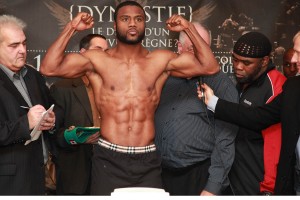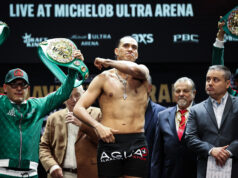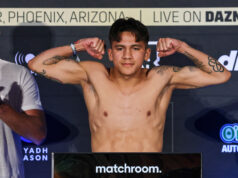
There’s irony in every Bernard Hopkins controversy. No one, that is, means exactly what he says. Hopkins talks and talks and sees what sticks in his admirers’ collective craw. He plays them like umbrage-tuned fiddles. Except that he doesn’t, not quite, because for all their hectoring, his fans rarely care enough to buy tickets.
That is why a man who calls himself legendary had to travel to Canada to find his first packed house in ages. His opponent sold tickets. And so his opponent, the champion, got the benefit of most every doubt. Welcome to life.
Saturday at Quebec City’s Pepsi Coliseum, American Bernard Hopkins likely did enough to win his challenge for the Ring magazine’s light heavyweight championship against Quebec’s Jean Pascal. But the judges saw things differently, scoring the fight a majority draw: 113-113, 114-114 and 114-112 (Hopkins). Since that last card cannot act as a tiebreaker, Pascal remained the champion, and Hopkins’ effort to break George Foreman’s record as the oldest man to win a title fell a spot short.
My card? I had Pascal retaining his title a conventional way: 115-113. An odd tally, that. How did I get it? I gave Pascal rounds 1, 3, 8, 10 and 12. Hopkins won rounds 2, 4, 6, 7 and 11. I had rounds 5 and 9 even. And rounds 1 and 3 went to Pascal 10-8 because he scored knockdowns in both.
You agree? I don’t care. You disagree? I still don’t care. The fight was excellent. It was entertaining the entire way, even when it wasn’t entertaining – because of what that implied – and there’s something else: My scorecard for a Hopkins fight affects my identity not in the slightest.
Pascal-Hopkins I was much better than most believed it would be. Hopkins was much more fun to watch than even he believed he would be – as evidenced by his smile in the final round.
I hope they do it again. And unless Hopkins can suddenly locate 10,000 new fans to complement his usual draw, I hope they do it again in Quebec City.
Let me guess. You hate Canada now. Very well. But realize, as you rail against Canadian injustice, that your hatred of Canada says much more about you than it says about that land of polite, decent people who happen to support boxing in a way that makes American prizefighters envious. And don’t pretend for a moment you weren’t more enticed by the moments before a Hopkins fight, Saturday, than you have been in years.
Oh, the electricity in that building; like a celebration of our sport. And Hopkins’ approach in round 1 was perfect for it. He expected overenthusiasm from a young, emotional opponent. And how do you foil such an action fighter? With a backwards step, of course.
Forward-pressing guys like to get you lined-up and throw themselves at you, regardless of consequence. You hit them, they hit you, whatever. Pascal wanted to make contact with Hopkins, and make it on his terms. Once Hopkins showed the mien of a man willing to engage, making his own forward presses, Pascal should come forward, and when he did, like all action guys before him, he’d get his weight wrong-shifted. Then he’d be vulnerable.
But then you noticed Pascal had an interesting counter to that. He’d imagined correctly beforehand how a man of Hopkins’ experience and craft would undermine a forward-press from a younger man. The solution Pascal hatched was novel.
He would show Hopkins all the enthusiasm expected from the first punch in his combo. But it would be a punching feint, as it were; the first punch wouldn’t be much at all. Hopkins would relax or counter. Then Pascal would blast him with the committed part of his combination – the second punch.
Hopkins looked fragile in those opening 12 minutes, make no mistake. His body softer than before, his legs not set sturdily beneath him, Hopkins went down three times in the opening four rounds. The last was called a push. The first, caused by a right hand to the back of Hopkins’ left ear in round 1, was properly called a knockdown. The second, from a short left hook that caught Hopkins coming off the ropes in the third, was indisputable.
Didn’t stop Hopkins from disputing it, though, did it? Nah. He stood, blamed a wet spot on the canvas, said he’d slipped, even checked the mat for moisture with his boot. Irony everywhere.
But by round 6, Hopkins had Pascal completely solved. With left hooks to the body and right crosses, Hopkins put Pascal in a place that frightened the champ. Pascal responded honorably if not effectively. Then instead of chasing Pascal’s unconsciousness, Hopkins sensed Pascal’s weakness and decided to clown around.
Not exactly the way Foreman set the record against Michael Moorer.
The ending to the fight was wonderful, though. Both men traded like maniacs. Rounds 10, 11 and 12 could have gone to either.
After the final bell sounded, Hopkins began to campaign for his victory. He protested a bit too much – almost like Marvin Hagler dancing after his final round with Sugar Ray Leonard. It was for the judges, you figure. The cards they returned, really, were fine. Hopkins’ reaction was the usual. But he’d have made a more sympathetic figure of himself if he had tried harder for a knockout in the sixth, seventh and eighth rounds.
Anyway, he now has a chance to be an even older man when he beats Pascal in a rematch. I think he will if the fight happens. Still, he just made a far more compelling spectacle against Pascal than others have.
Should Bernard Hopkins retire? Not unless Chad Dawson does first.
Bart Barry can be reached at bbarry@15rounds.com. Additionally, his book, “The Legend of Muhammad Ali,” co-written with Thomas Hauser, can be purchased here.










